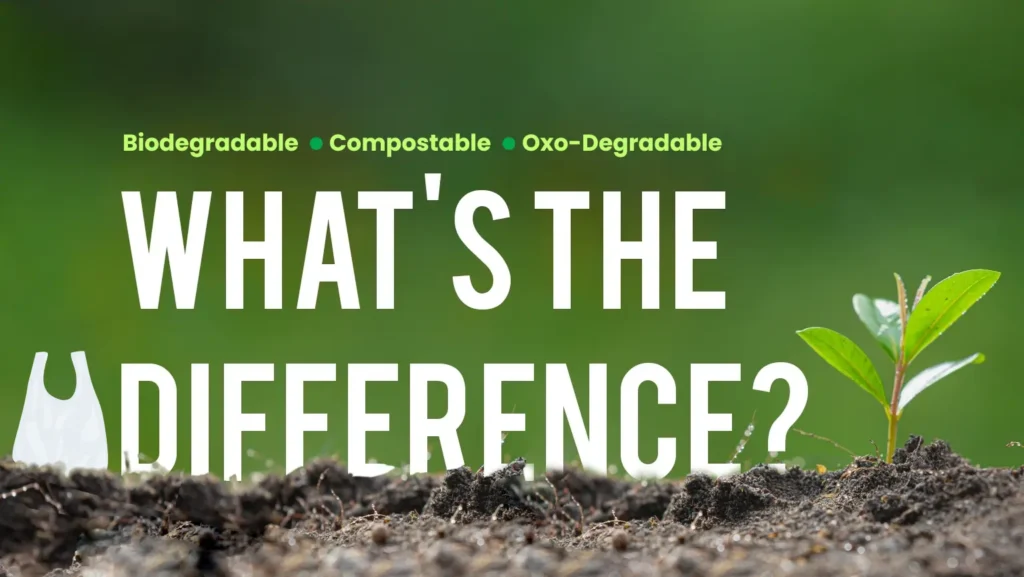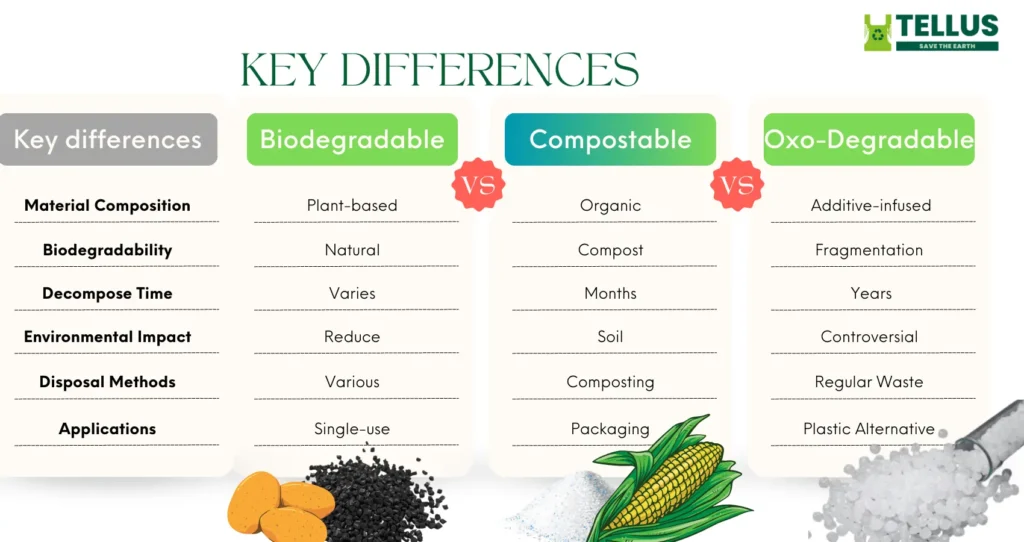
In the era of heightened environmental awareness, the quest for sustainable alternatives to traditional plastics has led to the rise of various eco-friendly materials. Among them, biodegradable, compostable and oxo-degradable carry bags have gained prominence. As part of this exploration, it’s worth noting that Tellus by BBMedicare is at the forefront of sustainable practices, manufacturing corn starch bio-compostable bags that align with the growing demand for environmentally friendly solutions.
Certainly! Here’s a breakdown of the differences between Biodegradable, Compostable and Oxo-degradable bags: –
1. Biodegradable:
Biodegradable refers to the ability of a material to break down naturally over time into simpler substances through the action of microorganisms, such as bacteria or fungi.
Sustainability :-
Biodegradable materials can be more environmentally friendly than traditional plastics because they can degrade without leaving persistent residues.
Characteristics :-
Not officially defined, may mislead. Some may take hundreds or thousands of years to decompose. Not indicative of the time required for decomposition.
Typically, eco-friendlier and more efficient than regular plastic. Examples: PLA (Polylactic acid), PHA (Polyhydroxyalkanoate).
2. Compostable:
Compostable materials are a subset of biodegradable materials that break down into organic, non-toxic components and contribute valuable nutrients to the soil when processed in a composting facility.
Sustainability:
Compostable materials are generally considered more sustainable because they mimic natural processes and can be part of a closed-loop system when composted, reducing the reliance on landfills.
Characteristics:
- Decomposes fully without leaving toxic residues.
- Breaks down or disappears quicker than some biodegradable counterparts.
- Suitable for recycling, avoids contamination issues.
Identification:
Certified compostable logo, with variations for industrial and home composting.
Timeframe: Should disintegrate within 90 days in commercial compost.
3. Oxo-degradable:
Oxo-degradable plastics are conventional plastics (usually polyethylene) that are mixed with additives to accelerate their fragmentation into smaller pieces when exposed to oxygen and UV light.
Sustainability:
The sustainability of oxo-degradable plastics is controversial. While they may break down into smaller pieces, these fragments can persist in the environment and there are concerns about the long-term environmental impact. Some argue that oxo-degradable plastics may contribute to microplastic pollution.
Characteristics:
Marketed to address soil and marine pollution. Evidence suggests they contribute to microplastic pollution. Not suited for long-term reuse, recycling at scale, or composting.
Concerns: Claims of accelerated biodegradation are unfounded.
Bans: Oxo-degradable plastics contribute to microplastic pollution, particularly in the ocean. They are unsuitable for long-term reuse, recycling or composting, conflicting with circular economy principles. The Environmental Services Association emphasizes the unfounded claims of their biodegradability.

Conclusion:
Biodegradable: Efficiency varies, not indicative of decomposition time.
Compostable: Certified for complete biodegradation, suitable for specific compost systems.
Oxo-degradable: Not recommended due to microplastic pollution risk and lack of proven biodegradability.
When selecting sustainable packaging, it’s essential to differentiate between these options and adhere to proper disposal methods. Always seek out eco-friendly packaging to make informed choices for a more sustainable future. Should you have any inquiries regarding sustainable packaging solutions, please don’t hesitate to reach out to our experts for guidance. In the pursuit of sustainable living, choosing the right type of carry bag becomes a pivotal decision. Our exploration of biodegradable, compostable and oxo-degradable bags has shed light on the distinctions and implications associated with each.
As we conclude this journey of decoding sustainability, it’s clear that Tellus by Bbmedicare, as a bio-compostable bags manufacturer, stands out in providing an eco-friendly alternative. The commitment to creating bags that not only serve practical needs but also align with environmental responsibility is commendable.
In the spectrum of carry bag options, the biodegradable and compostable choices emerge as the frontrunners for those seeking a green alternative. These bags, when sourced from a reputable manufacturer like Tellus, offer a sustainable solution that minimizes environmental impact.
As consumers, let’s recognize the power of our choices. Opting for bio-compostable bags is not just a trend; it’s a conscious step towards a healthier planet. The journey towards sustainability is ongoing, and with informed decisions, we can collectively contribute to a greener, more harmonious future.
Choose Tellus – Choose Sustainability.

